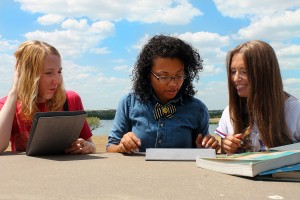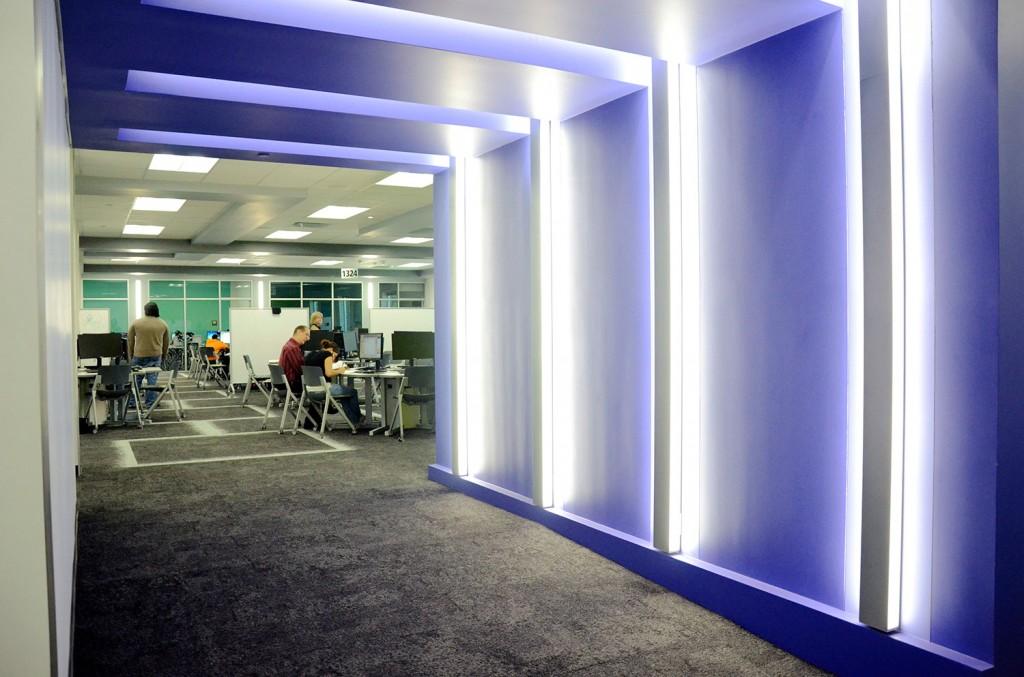By Kirsten Mahon/nw news editor

A pilot program on NW and South campuses this semester gave Cornerstone students brand new iPads to use in class.
Cornerstone students in honors courses use the pads during class time to interact with their instructors and classmates. Some instructors have even constructed lesson plans designed to fit with the new pads.
Around 75 NW students have rented the pads this semester. When the honors students graduate with an associate degree, they can keep the iPads, said Lynn Preston, NW biology professor. Preston said she worked with Tim Marshall, vice chancellor of information and technology, last year, developing a program that would incorporate these devices in class.
“It opens it up for the instructors to challenge us more,” said Sarina Moss, NW student and Cornerstone fundraising committee head. “Our speech teacher had us make electronic posters.”
Moss is taking only honors classes this semester. She said all of her honors teachers are incorporating the device into lesson plans. She and her classmates are preparing for a speech showcase on NW in December. They were instructed to create a poster for the presentations, but instead of a hard copy poster, they are using the iPads to make interactive posters to keep audiences engaged.
Kirsten Cooper, NW academic support services coordinator, pushed for the pilot program after visiting a conference at Abilene Christian University that showcased students using their handheld devices for studies.
“We observed how the students were able to use it as a personal device and a learning tool,” Cooper said. “We decided to try it as a pilot to see what type of feedback we got from students and faculty.”
Cornerstone students were chosen to test the idea because they are normally grouped in classes with instructors who favor the new learning strategies that could be implemented, Cooper said.
This kind of study would require the students to collaborate outside of class on projects so the administration could see how well the devices worked for TCC students.
Moss said her teachers have also instructed her to do “on-the-spot research” during class, where students will look up important topics, people and places that pertain to the lesson. In her Texas Government class, she has the option to write a 10-page paper or use the iPad to make a 10-minute documentary.
“We’ll be able to show them what we’re doing,” she said, adding that instructors can monitor student progress over the course of a project. “We’ll have access to film editing apps that we can use.”
Jeremy Byrd, South philosophy professor, said the program monitors the growth of learning possibilities and the effects of using an electronic device in class.
Marshall said the administration is working on purchasing iPads for the other three campuses over the course of the semester. Each pad is $500 with an educational discount including an extended warranty. He is unsure how long it will take to get more iPads in the hands of students, he said.
“It’s taking time to get the money in,” he said. “There’s a little bit of a price break when you buy 10 at a time.”
Marshall said to have this technology involved with the curriculum also required a support staff to help with technological problems.
“My staff was ready for 10 or 15 iPads on each campus,” he said.
About 50 students are in the program on NW and about 25 on South.
“We’ll have a student call-in desk later on this semester,” he said.
Students who already have the iPads are using them in class now.
“It’s transformed how the class runs,” Byrd said. “I have been able to communicate and organize the students in ways I never have. I can text the whole class.”
Byrd said other advantages include iTunes University, which features lectures and courses online from Stanford University and Massachusetts Institute of Technology.
Well-known professors give speeches and conduct classes that are broadcast online for free. Moss said having the iPads in class allows students to use a decent tool they otherwise could not afford.
They can also take advantage of cheaper e-book prices online. Byrd said he used textbooks for his class that he knew his students could purchase and download from Amazon Kindle.
“It’s great to have,” Moss said. “It’s convenient being able to just whip open my iPad and take down a quick note for an interesting conversation.”























